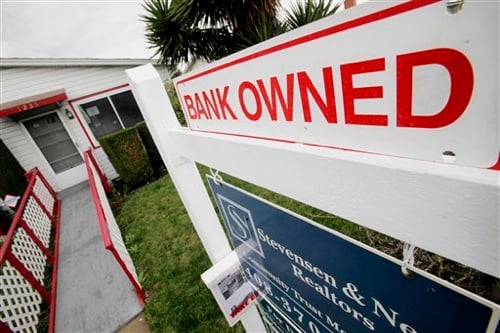Congress and the SEC could require ABS packagers to hold some asset-backed securities on their books. Wall Street is not thrilled by this idea.
Remember mortgage-backed securities? They were the go-go house of cards that collapsed and nearly brought down the financial system, helping usher in the recession.
In response, lawmakers and government agencies have been trying to lay down stricter rules for asset-backed securities.
The Securities and Exchange Commission will weigh in Wednesday by proposing Wall Street firms that package and sell asset-backed securities be required to provide fuller disclosures on them.
The disclosures would include information on every underlying loan in a package. For example: What type of mortgage loan was involved? Were complete documents required from the borrower? Or was it a "no-doc" or "liar loan"?
The idea is to give investors more information to better judge the securities' risk. That would reduce reliance on the Wall Street credit rating agencies. The three big agencies — Moody's Investors Service, Standard & Poor's and Fitch Ratings — were widely criticized for failing to give investors adequate warning of the risks in subprime mortgage securities that triggered the financial crisis.
The SEC commissioners are expected to propose the new rules at a public meeting Wednesday. The rules could be formally adopted after a public comment period, possibly with changes.
A key question as lawmakers and regulators look to craft new rules is whether the firms that issue the securities should have to hold a portion of those investments on their own books.
With some "skin in the game," the thinking goes, Wall Street firms would be more careful to ensure that borrowers are properly screened. Experts say it was the lack of that "skin" that enabled a system in which the mortgage bundles were whisked from investor to investor, with no one assuming the risk until the roof caved in.
Provisions in the House and Senate versions of legislation to overhaul financial regulation would require the "securitizers" to keep some of the risk themselves.
Another idea is for regulators to set an industrywide lending standard governing minimum down payments, borrowers' debt levels and other requirements. That has drawn opposition from financial industry interests.
The Federal Deposit Insurance Corp. has floated a proposal to require new standards for the lending industry. Asset-backed securities would have to meet the standards to maintain a guarantee that they wouldn't be seized from a bank by the government if the bank failed.
"These reforms will help restore investor confidence ... and prevent a recurrence of the crisis we are now working through," FDIC Chairman Sheila Bair said last month.
But industry interests maintain it would make banks skittish about investing in any mortgage-backed securities.
"Heaping on hundreds of ideas may ultimately weigh down the return of the market at a time when it's most needed" to make loans more available for consumers, Tom Deutsch, executive director of the American Securitization Forum, said Tuesday.







